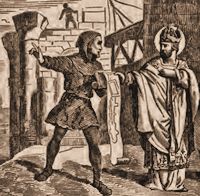Easter: April 15th
Monday of the Third Week of Easter
Other Commemorations: St. Paternus, Bishop (RM)
» Enjoy our Liturgical Seasons series of e-books!
The Roman Martyrology commemorates St. Paternus (482-586), Bishop. He first joined the monks of Ansion and later became a hermit near Coutances. Eventually he was consecrated bishop of Avranches, Normandy, France.
Meditation: Monday of the Third Week of Easter
Subjection to Authority
1. "Christ suffered for us, leaving you an example that you should follow His steps" (Epistle). Although St. Peter in the Epistle is urging all of his converts to be subject to legitimate authority, it is probable that he had in mind particularly the slaves who had been converted to Christianity. Slaves newly converted to Christ were apt to misunderstand the Christian concept of liberty, freedom, and equality. Writing to the Galatians St. Paul had asserted that among Christians "there is neither Jew nor Greek, there is neither bond nor free; there is neither male nor female" (Gal. 3:28). But neither St. Paul nor St. Peter meant to deny that these differences did exist in fact. They meant that once a man was incorporated into the mystical body of Christ, he ought to act as if they did not exist when dealing with fellow Christians. But the apostles were realists, and although they may have felt that all men ought to be free and equal, and that there ought not be any distinction between masters and slaves among Christians, they knew that this principle might not always be easy to enforce. St. Peter was instructing his converts how they ought to react when the ideal of Christian equality and justice could not be enforced.
2. "Christ suffered for us, leaving you an example that you should follow His steps" (Epistle). The Christian slave might complain that his membership in the Church had not alleviated the harsh conditions of his life. St. Peter points to the example of Christ who was in all things to be the model of the Christian.
Christ, he says, did not deserve to suffer either, for "He did no sin, neither was guile found in His mouth," but nevertheless he was subjected to persecution and injustice. But the Christian is expected to be a follower of Christ, who "when He was reviled, did not revile; when He suffered, He threatened not, but delivered Himself to him that judged Him unjustly." If then Christians feel that they have not achieved the liberty and the equality they long for, they are to remember that Christ had come not to right all the wrongs and injustices in the world, but to give an "example that you should follow His steps."
Men often complain against God when they suffer what they consider undeserved misfortunes. They think that God ought to interfere and punish injustice and wickedness here and now. They are like the apostles James and John; they want to call down fire from heaven and destroy those who appear to them to act improperly. This is the spirit of the world, but it is not the spirit of Christ. "You know not of what spirit you are. The Son of man came not to destroy souls, but to save" (Luke 9:55). Christ made it clear that all injustice will be rectified eventually, but that for the present He wishes to allow the cockle to grow among the wheat. When the proper time comes God will deal with injustice in His own way.
3. But it is not only the slave who is to be subject to authority, and to recognize that mistreatment patiently borne is a service acceptable to God and meritorious for man. Obedience to legitimate authority does not depend on the worthiness of the official exercising authority. Christ Himself had commanded His disciples to obey the officials of the Jewish Church, even though they might not be personally worthy of the office they held. He had Himself given the example. He was obedient first of all to His parents. "He went down with them and came to Nazareth, and was subject to them" (Luke 2:52). He observed the ritual and the laws of the Jewish Church, for He Himself had established them. He obeyed the laws of the Roman authorities and paid the tribute they demanded.
The Christian, then, is to follow in the steps of Christ. He need not expect that he will always be treated justly even by other Christians placed in authority over him. If he is not, following in the steps of Christ, and imitating His example, he is not to revile when he is reviled, he is not to threaten when he suffers unjustly, for "Christ suffered for us, leaving you an example, that you should follow His steps." If the Christian is prepared to imitate the humility of Christ, he may expect eventually to be delivered from the perils of eternal death, and to enjoy the endless happiness of heaven with Christ.
—Benedict Baur, OSB, The Light of the World, Vol. 2
St. Paternus
 St. Paternus was born at Poitiers, about the year 482. His father, Patranus, with the consent of his wife, went into Ireland, where he ended his days in holy solitude. Paternus, fired by his example, embraced a monastic life in the abbey of Marnes. After some time, burning with a desire of attaining to the perfection of Christian virtue, he passed over to Wales, and in Cardiganshire founded a monastery called Llan-patern-vaur, or the church of the great Paternus.
St. Paternus was born at Poitiers, about the year 482. His father, Patranus, with the consent of his wife, went into Ireland, where he ended his days in holy solitude. Paternus, fired by his example, embraced a monastic life in the abbey of Marnes. After some time, burning with a desire of attaining to the perfection of Christian virtue, he passed over to Wales, and in Cardiganshire founded a monastery called Llan-patern-vaur, or the church of the great Paternus.
He made a visit to his father in Ireland, but being called back to his monastery of Marnes, he soon after retired with St. Scubilion, a monk of that house, and embraced an austere anchoretical life in the forests of Scicy, in the diocese of Coutances, near the sea, having first obtained leave of the bishop and of the lord of the place. This desert, which was then of great extent, but which has been since gradually gained upon by the sea, was anciently in great request among the Druids. St. Paternus converted to the faith the idolaters of that and many neighboring parts, as far as Bayeux, and prevailed upon them to demolish a pagan temple in this desert, which was held in great veneration by the ancient Gauls.
 In his old age he was consecrated Bishop of Avranches by Germanus, Bishop of Rouen. Some false brethren having created a division of opinion among the bishops of the province with respect to St. Paternus, he preferred retiring rather than to afford any ground for dissension, and, after governing his diocese for thirteen years, he withdrew to a solitude in France, and there ended his days about the year 550.
In his old age he was consecrated Bishop of Avranches by Germanus, Bishop of Rouen. Some false brethren having created a division of opinion among the bishops of the province with respect to St. Paternus, he preferred retiring rather than to afford any ground for dissension, and, after governing his diocese for thirteen years, he withdrew to a solitude in France, and there ended his days about the year 550.
—Excerpted from Lives of the Saints, by Alban Butler, Benziger Bros. ed. [1894]
Highlights and Things to Do:
- Read more about St. Paternus:






